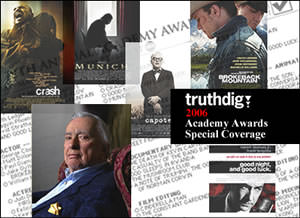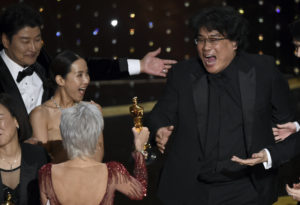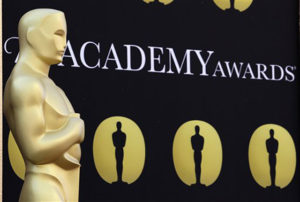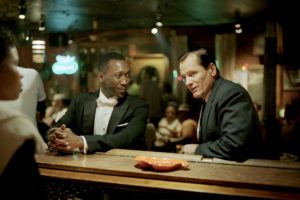Gore Vidal on ‘Capote,’ ‘Brokeback Mountain’ –and Why ‘Match Point’ Is the Best Picture of 2005
In a Truthdig interview, America's most celebrated man of letters weighs in on this year's Best Picture nominations and recalls his own encounters with Truman Capote. (Or, listen to an expanded podcast version.)
Prize-winning novelist, essayist, playwright and screenwriter Gore Vidal sat down with Truthdig’s Sheerly Avni on March 2 in the living room of his home in Hollywood. He spoke candidly about America’s prudishness, his admiration for Ang Lee, and Truman Capote’s Proust complex.![]()
Click here for audio of the expanded version of this interview.
Sheerly Avni: Let’s start with “Brokeback Mountain.”
Gore Vidal: I liked it, I’m a great fan of Ang Lee. He did the best Civil War movie ever made, called “Ride With The Devil.” And it was really, really good. Lee had an extraordinary feeling, for somebody from Taiwan, for the American Civil War. It was just fascinating. So I was eager to see the movie about the two sheepherders, actually is what they are, they’re not cowboys. You can see there’s not a cow in the movie, just a lot of sheep. You can see how the two sheepherders might get tired of the sheep and begin to look to each other, as a kind of variation on a theme. I liked it, I thought it was quite moving, obviously thematically it’s important to do a picture like that about two ordinary men, seized at a time in which all this is forbidden and so on.
It would have been nice, at the same time, if…it would have been better had they started with Kinsey, which was practically erased by the Academy, to which, alas, I belong. I thought that was a terrible error, because it was the best movie of last year, and informative and instructive: You learned a lot about the nature of human sexuality, that there isn’t just one good team and one bad team and one healthy team and one sick team. It’s not that at all.
Sex is a continuum. You go through different phases along life’s way … and if you don’t, you’ve been sort of cheated.
If this film were to win an Oscar, would it be a step forward in tolerance? How important is Hollywood in this equation?
Well, it never has been, and I don’t see why it should be suddenly now. That it was made at all and that it was made so honestly and so well is a good thing, better than to make a mess out of it, or not try at all….
Look, homophobia is fed into every child in the United States at birth. It is unrelenting, it never lets up. They asked a whole raft of high school boys across the country a couple years ago, one of those polls about what they would most like to be in life, and what … they would hate to be, and so forth, and what they would most hate to be was homosexual.
There wasn’t anyone, not one, who just skipped the question. They all said “oh no, that’s the worst thing you could be.”
To get over that training, that’s generation after generation. And it has not done the character of our nation much good. And that’s why we are a joke to the rest of the world, because we carry on about sexual matters everyone else has forgotten about.
Mitterrand had his mistress at his deathbed, no problem.
No problem. And the events that befell poor President Clinton were all done because he wanted healthcare for everyone in the country, so you get him on dalliance with Monica in the White House. A matter of no importance at all — and no one’s business at all, except his. And that was interesting because that was the impeachment of a president for something that he had done, which was fibbing about — did he know her in the biblical sense. So they say, “That’s perjury, we don’t want a liar for president.” Look what we’ve got now; we don’t get the truth — ever. This was all cooked up to destroy the most intelligent politician in the history of the United States. And like a fool, he agreed to answer the questions. If I were he I would have ordered Starr out of the White House, and said, “If you come back I’ll have you arrested.” It’s as simple as that. And he would have won anyway, as it was proved. There are times that you must stand up and your private life is private and public life is public.
So will this movie change anything? I think it might give some people a little more heart that what they’re doing is not so unusual. It is traditional, it is biologically correct; mammals have been performing same-sexual acts ever since the first mammal was created. I was not present, alas, at the time, but mammals do behave like that and to say they don’t or to try to frighten them as all those schoolboys have been frightened … well that kind of indoctrination is awful, it makes us seem like a very stupid country to other people, with stupid laws. People are in prison for having done “unnatural acts” as they call it.
Who is to say what is an unnatural act if it is natural for a person to [interrupts himself, affecting an outraged voice] — “Oh, but then you’re in favor of murder!” They go straight from sex to murder so quickly, just as they do in print. Sex and violence! Sex-and-violence! This is the only place on Earth that the two things are one word: sexandviolence! Well, sex has nothing to do with violence unless it’s rape, and then we have other laws to take care of that.
May we ask you about “Capote”?
Oh, Capote. [Sighs.] I spent half a century trying to avoid him, in life, and now suddenly I’m surrounded by him.
He was a pathological liar. He couldn’t tell the truth about anything, and he’d make it up as he went along. He always wore dark glasses, and his eyes would drop behind the dark glasses, and he would seem to be looking down at his nose, and then as he got more and more frenzied — the lies really very frenzied, they were orgasmic — you would start to see the eyes begin to roll up to see if you’d fallen for what he was saying.
And it was always about famous people, some he’d barely heard of before. I remember he told me once “I’m the American Proust.”
So I said, “So who’s your Mme Verdurin?”
“Who?”
He had not heard of one of Proust’s principal characters. He was confidently illiterate. It’s highly suitable that he would become iconic, because he didn’t know anything, and never told the truth. Doesn’t he fit in the age of Bush?
Did you find the movie to be an accurate reflection of his personality?
Well no, but it wasn’t supposed to be. It was a good movie, and they touched upon his treachery towards the two boys. He wants them to swing, because if they don’t he can’t finish his book and if he hasn’t finished his book, he’s in trouble.
Kenneth Tynan, a great critic of that period, did an attack on “In Cold Blood.” It ran in The Observer in London. The headline was “For Cold Cash,” which was about the right tone, and that was pretty much the tone of the movie. The movie is quite brave about showing somebody who did not have any redeeming characteristics, nor did they pretend he had.
And how about the book itself?
Oh, I couldn’t read it. I read a bit of it in The New Yorker and thought; I’m not interested in murders, and pointless ones at that! I don’t know what excitement he got out of it. Obviously some voyeuristic aspect of himself was well served by contemplating it.
In the film he had a frightening way of being able to create an empathetic connection with whomever he was trying to seduce at the time. Did he have that in real life as well?
Yes, he was a very astute flatterer.
Doesn’t sound like it worked so well on you.
No, it didn’t. We were always linked, my first bestselling novel was in 1948 and his was also published in 1948. He was a year older than — I was 23, he was 24. And there we were, our names were forever linked on the bestseller list, and he started saying things about me, which people were delighted to hear.
But I just avoided him for years…. You know, there is a second Capote movie coming up, and I’m in it. I’m being played by quite a good British actor — Rupert Everett. I ran into him recently, and he told me he was playing me, and so I said well, have a good time, and he said, “You know I’ve been complaining it’s such a small part.”
I said, “Because I avoided Capote!” [Laughs.]
And finally, which film do you think should win?
“Match Point” [which was not nominated]. I loved it. Woody Allen was the best filmmaker who was presented to us, and it’s one of his best movies. It’s realism. Life is mostly luck! And the protagonist is a lucky guy. The fact that he’s a bad guy is neither here nor there. Bad guys do very well too.
It’s a very cold, dissecting movie. There’s not a lot of love there.
I don’t go to movies for love, do you?
Don’t miss Part II of this interview coming the week of Mar. 6.
Your support matters…Independent journalism is under threat and overshadowed by heavily funded mainstream media.
You can help level the playing field. Become a member.
Your tax-deductible contribution keeps us digging beneath the headlines to give you thought-provoking, investigative reporting and analysis that unearths what's really happening- without compromise.
Give today to support our courageous, independent journalists.






You need to be a supporter to comment.
There are currently no responses to this article.
Be the first to respond.